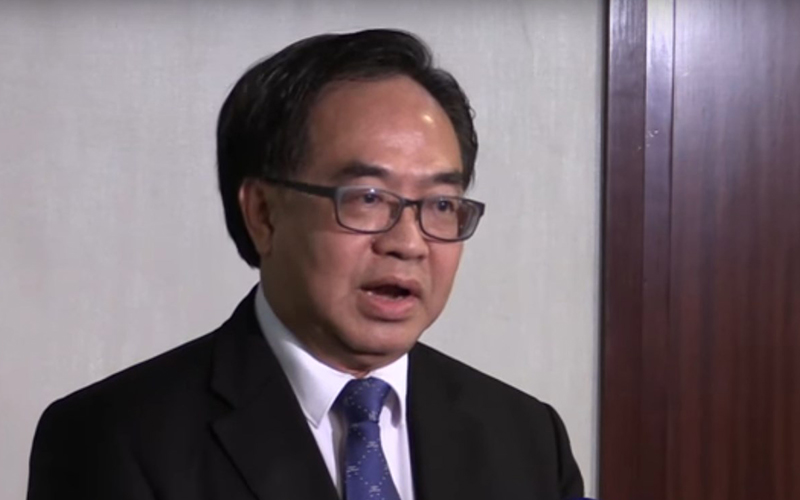Pro-Beijing lawmaker Lo Wai-kwok has said the legal challenge lodged against his loyalty pledge to China and Hong Kong “has little grounds,” since his British citizenship acquired through a selection scheme back in the 1990s was not recognised by China.
Kwok Cheuk-kin, a Cheung Chau resident nicknamed the “king of judicial review,” lodged the judicial review on Monday. Kwok said that Lo had pledged loyalty to Great Britain. Given that Chinese laws do not recognise dual nationality, Lo could not have “faithfully” sworn allegiance to the Hong Kong SAR at the legislature last month, Kwok said.
In response, Kwok first cited the Article 67 of the Basic Law, stating that foreign nationals or those who have right of abode in foreign countries could become lawmakers, provided that the proportion of such members does not exceed 20 percent of the total membership of the Legislative Council.

Lo was elected through the engineering sector which allows foreign citizenship holders to occupy seats.
Lo then cited Instrument 15 of the Basic Law, which was a set of explanations made on 15 May 1996 by the Standing Committee of the National People’s Congress concerning the implementation of the Chinese nationality law in Hong Kong.
The Instrument reads: “According to the Nationality Law of the People’s Republic of China, the British Citizenship acquired by Chinese nationals in Hong Kong through the ‘British Nationality Selection Scheme’ will not be recognised. They are still Chinese nationals and will not be entitled to British consular protection in the Hong Kong Special Administrative Region and other parts of the People’s Republic of China.”
The British Nationality Selection Scheme, through which Lo gained his British citizenship, was set up in 1990 to offer 50,000 eligible families in Hong Kong citizenship if they had worked as civil servants or professionals in certain fields.

Lo said he has taken the same oath as other lawmakers who only have Chinese nationality and “there was no legal dispute.”
“This judicial review has little grounds – many friends from the legal sector agreed, but of course it should be handled by the court,” he said.
Lo added that he uses the passport as a travel document and it will expire next year. He said he did not consider extending it.
Bear allegiance to Queen
On Monday morning, Lo said on a Commercial Radio programme that he did not recall pledging loyalty to the UK when applying for citizenship. However, the UK’s British Nationality Act 1981 states that a certificate of naturalisation shall not be granted unless the applicant has taken an oath of allegiance.
The oath reads: “I, A.B., swear by Almighty God that, on becoming I will be faithful and bear true allegiance to Her Majesty Queen Elizabeth the Second Her Heirs and Successors according to law.”
Beijing made a significant change to Hong Kong’s mini-constitution in its ruling earlier this month. The Basic Law requires public officers to swear allegiance to “the Hong Kong SAR of the People’s Republic of China.” However, Beijing’s ruling said that oath-takers must pledge loyalty to “the People’s Republic of China and its Hong Kong SAR.”
Barrister Martin Lee has warned against the subtle but substantial change of wording, saying the implication would be that Hong Kong public officers are bound by Chinese law. Under the One Country, Two Systems policy, Chinese laws do not apply in Hong Kong with a few exceptions related to defence and foreign affairs.

Meanwhile, Regina Ip Lau Suk-yee, another lawmaker challenged by Kwok, said the accusation was without basis.
Kwok said lawmaker Regina Ip had borne allegiance to the Queen when she took office as the immigration director in the colonial government, violating Beijing’s ruling requiring public officers to pledge loyalty to “China and Hong Kong.” He argued that Ip had failed to “faithfully and truthfully” take her oath.
“When I became Director of Immigration in 1996, it was a rotation for civil servants, it was not necessary to pledge loyalty to the Queen, there is no question of double allegiance,” she said.
She said she first pledged loyalty to “Hong Kong Special Administrative Region of People’s Republic of China” and to uphold the Basic Law when she became Secretary for Security and a member of the Executive Council in 1998.
“It is wasting the court’s resources when people apply for judicial reviews without having clear knowledge of the facts,” she said.
